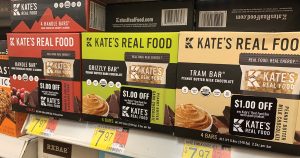The Supply Side: Kate’s Real Food energy bars now in 1,000 Walmart stores
by August 22, 2020 9:51 am 2,656 views

It’s a long way from Grand Teton to Bentonville, but news about good-for-you food travels fast. That’s how Kate Schade, a skier and outdoor enthusiast, got her all-natural energy bars on the shelves of the world’s largest retailer.
Schade said James Cameron, a senior Walmart executive, visited Wyoming and tried one of the bars in July 2019 and asked Lauren Alden, Walmart’s category buyer, if she was interested in adding the product to Walmart shelves.
It wasn’t long before Schade received an email from the retailer asking to try the bars. There was no Open Call or trade show introduction. Schade and her team were cold-called by Walmart, based on Cameron’s experience.
Schade admits the category is crowded, but her certified organic recipe is gluten-free, soy-free and contains no artificial ingredients such as sweeteners. The bars are made of whole foods and sweetened with organic honey, dark chocolate and dried fruits or nuts. They are peanut butter or almond butter-based and contain oats or crispy brown rice for complex carbohydrates. She said the Walmart buyer also was pleased with the taste and got the ball rolling in late 2019. Alden left her position as Walmart’s snack buyer in February, but Kate’s Real Food energy bars survived the transition.
Fast-forward one year from Cameron first tasting Schade’s product, and Kate’s Real Food bars have landed on shelves in about 1,000 Walmart stores. The company got three SKUs (items) in stores, all versions of the Tram bars she first created more than 10 years ago.
In a recent LinkedIn post, Cameron said, “Great products will always find their way to our shelves. When I brought a bar I had tried back from Wyoming last year and asked Lauren Alden if she was interested, it was a joy to watch her make it happen.”
Matt O’Rell, vice president of sales at Kate’s Real Food, said the journey into Walmart stores went pretty smoothly. He made a trip to Bentonville, and Schade’s small team worked closely with Walmart to ensure the first order was sent out on time in June.
Kate’s Real Food energy bars were being sold on Amazon, in select Whole Foods stores and several other regional retailers. She said Walmart is the first national exposure the brand has received. She’s grateful to be working with the retail giant in its focus to get more healthy and affordable certified organic foods in stores for consumers at all income levels to afford and enjoy.
ORIGIN STORY
Schade said her Tram bar had its early beginnings back in the mid-’90s, and over the course of many years, she perfected the recipe and became a sole proprietor in 2005.

“I began experimenting with whole foods, organic ingredients, and I finally got the recipe right. I named them Tram bars because that’s where they got eaten most of the time. I gave them to friends and soon had to start charging them for some of the costs because they kept wanting more,” Schade said.
She said the products were born out of her need for a filling, quick food solution she could consume while riding the ski tram between runs at Jackson Hole, Wyo. In the early years, Schade worked two other jobs and made the bars in her spare time in a commercial kitchen she had access to as a restaurant employee. She said selling to friends and farmers markets was how the business got its start, but that all changed in 2010 when she partnered with Bruce Thaler, who was interested in helping Schade grow the business. Schade quit her other jobs in 2010 when she partnered with Thaler and began to focus solely on Kate’s Real Food.
“We grew slowly and organically at first, made mistakes, but reeled it back in, and have kept growing since,” she said.
Schade said she grew up in a hardworking family and recalled her mom giving her a ledger at 11 years old. She has no formal business training but said she hails from a family of bankers and farmers and credits her upbringing for helping her in the business world.
Schade is passionate about using whole foods that are certified organic and ensuring the end product is chewy, crunchy, tasty and easily digestible. In 2010, she assembled a small team in Idaho to make the bars. The operation could make about 1 million bars annually. Within a few years, the brand had outgrown the Idaho production facility. That’s when Thaler urged her to expand production with a $5 million investment and plans to shift manufacturing into a new plant in Bedford, Pa.
O’Rell said with incentives from the state of Pennsylvania, the 20,000-square-foot manufacturing facility opened in May. The plant employs about 50 people who earn $15 an hour. He said the plant opened just in time to run the initial order for Walmart.
Schade said the new production in Pennsylvania turns out a product with no compromise in the quality. The new facility allowed Schade to grow the business. Plant capacity is 20 million bars a year. Even with the Walmart business, the plant is still operating at 15% capacity. Schade said Thaler runs the manufacturing facility and handles ingredient sourcing as a full partner in the company.
Thaler and Schade are conscientious about sustainability and opted for smaller packaging — the bars are sold in four-packs. She said Walmart opted for three of the Tram bar flavors, and the price at less than $2 per bar also worked for her.
“We want to be affordable and leave no shopper out. We are excited Walmart is focusing on offering more affordable organic and gluten-free foods to families without busting their budgets,” Schade said.
Hannah Robbins, chief marketing officer at Kate’s Real Food, said Walmart’s support of U.S. manufacturing jobs appealed to the company because it was in the process of opening the manufacturing plant.
When asked about challenges getting the product to Walmart for the initial order, O’Rell said even with buyer and replenishment transitions and some issues with the mandatory electronic transmission of invoices and data, the order made it out to stores in July.
“We have found our contacts at Walmart flexible and helpful throughout the entire process. We are excited about this opportunity to grow the business with a strong partner,” he said.
EDITOR’S NOTE: The Supply Side section of Talk Business & Politics focuses on the companies, organizations, issues and individuals engaged in providing products and services to retailers. The Supply Side is managed by Talk Business & Politics and sponsored by Propak Logistics.
